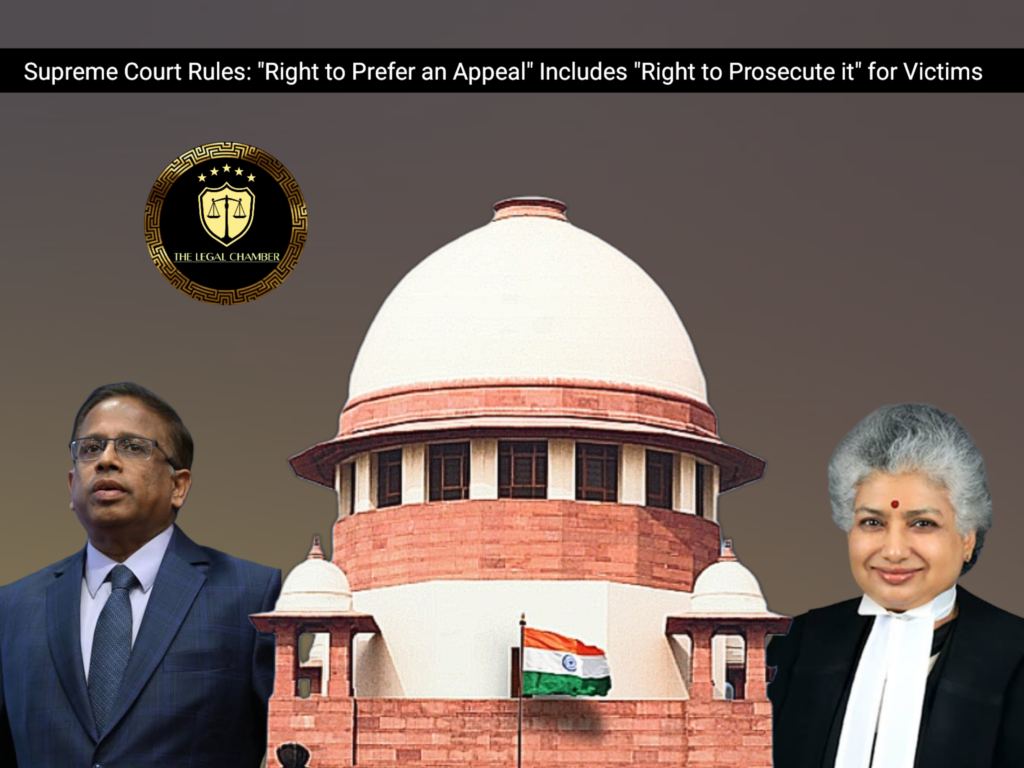
The Supreme Court held that the right to prefer an appeal under the proviso to Section 372 CrPC includes the right to prosecute it. Consequently, upon the death of the original appellant-victim, their legal heir is entitled to be substituted to continue the appeal. The definition of ‘victim’ under Section 2(wa) CrPC is broad and inclusive, enabling such substitution to ensure the right of access to justice is not defeated.
Facts Of The Case:
On December 9, 1992, an attack occurred in which Virendra Singh was killed, and informant Tara Chand (PW-1) and his son Khem Singh (PW-3) were injured. The Sessions Court convicted accused Ashok, Pramod, and Anil @ Neelu, sentencing them to life imprisonment, but acquitted six other accused. The convicted accused appealed to the High Court, which, vide a cryptic judgment dated September 12, 2012, acquitted them. The State did not appeal this acquittal. The original appellant, Khem Singh (an injured victim), challenged the acquittal before the Supreme Court. During the pendency of these appeals, Khem Singh died, leading to applications for condonation of delay, setting aside abatement, and substitution by his son, Raj Kumar, who was also an injured victim in the incident. The legal issue centered on whether a legal heir of a deceased victim-appellant could be substituted to continue prosecuting the appeal filed against an acquittal under the proviso to Section 372 of the CrPC.
Procedural History:
The procedural history began with the conviction of the accused by the Sessions Court, Haridwar, in 2004. The convicted accused then filed appeals before the High Court of Uttarakhand at Nainital. In 2012, the High Court allowed these appeals and acquitted all accused. The State did not file an appeal against this acquittal. Instead, an injured victim, Khem Singh, exercised his right under the proviso to Section 372 of the CrPC and filed Special Leave Petitions before the Supreme Court in 2017, which were granted leave and converted into criminal appeals. During the pendency of these appeals, the original appellant, Khem Singh, died, necessitating interlocutory applications for condonation of delay, setting aside abatement, and substitution by his legal heir. The Supreme Court’s 2025 judgment first decided these applications, allowing the substitution, and then proceeded to allow the criminal appeals on the merits, setting aside the High Court’s acquittal and remanding the cases for a fresh hearing.
READ ALSO :Clarifying Jurisdiction: Supreme Court Reaffirms Exclusive Power of MP Arbitration Tribunal for Public Works
Court Observation:
The Court made significant observations on the rights of victims under the CrPC. It held that the expression “right to prefer an appeal” under the proviso to Section 372 includes the “right to prosecute an appeal.” Consequently, the legal heir of a deceased victim-appellant is entitled to be substituted to continue the appeal, ensuring the right to access to justice is not defeated. The Court emphasized the broad and inclusive definition of a ‘victim’ under Section 2(wa), which encompasses legal heirs. It differentiated the victim’s right to appeal from that of the State or a complainant, noting it is a substantive right not circumscribed by the rigors of Section 378(4) CrPC. Furthermore, the Court found the High Court’s acquittal judgment to be cryptic and devoid of reasoning, failing in its duty as a first appellate court to re-appreciate evidence, which justified a remand.
Final Decision & Judgement:
The Supreme Court allowed the interlocutory applications, condoned the delay, set aside the abatement, and permitted the substitution of the original appellant with his legal heir. On the merits of the criminal appeals, the Court set aside the impugned judgment of the High Court dated September 12, 2012, which had acquitted the respondents-accused. The Court held that the High Court’s judgment was cryptic and lacked proper reasoning, as it failed to re-appreciate the evidence on record as required of a first appellate court. Consequently, the matters were remanded to the High Court of Uttarakhand for a fresh hearing and disposal of the appeals in accordance with the law. The accused were directed to remain on bail subject to furnishing fresh bonds. All contentions on merits were left open.
Case Details:
Case Title: Khem Singh (D) through LRs vs. State of Uttaranchal (Now State of Uttarakhand) & Another etc. Citation: 2025 INSC 1024 Criminal Appeal No(s).: Criminal Appeal Nos. 1330-1332 of 2017 Date of Judgement: July 31, 2025 Judges/Justice Name: Justice B.V. Nagarathna and Justice K.V. Viswanathan
Download The Judgement Here